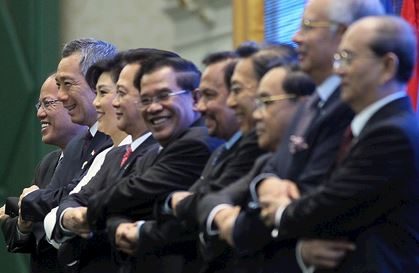As if it wasn’t bad enough that Indonesia’s parliament just voted to curtail democracy at the grass roots level, the Indonesian police have banned the democratic right to protest against the move at an international forum on democracy the government is hosting on the island of Bali. That’s almost as absurd as the military’s insistence in Thailand that it intervened to save democracy.
Nearly two decades into the 21st century, the struggle for democracy in Southeast Asia continues to battle strong headwinds. Sometimes, as in Thailand where the military seized power last May, this has resulted in a complete reversal of course. In Indonesia, where for the first time one popularly president will shortly transfer power to another as a result of free and mostly fair elections, the sudden course correction forced by a parliament dominated by conservative forces has everyone spooked and worried for the future. Will the long journey from darkness into light ever be smooth?
A wise and experienced politician in the region once said that the struggle for freedom was like driving a car uphill and he could not envision ever being able to take his foot off the gas. Arguably, this is a useful piece of advice for democrats everywhere, but it is particularly instructive in Southeast Asia where three generations of activists have been imprisoned, tortured or killed for their belief in freedom since the end of the colonial era only to see their countries lurch from the triumph of people’s power to betrayal and regression.
It’s not quite the same in other parts of the globe where democracy was fought for and flowered over a similar period. Transitions are real and sustained. In Chile and Argentina, the victims of repression are at last receiving justice. Kenya’s indicted President recently showed up at the International Criminal Court.
Here in Southeast Asia the word ‘transition’ imparts more ambiguity. Power changes hands more easily, but remains concentrated in the hands of the few. No attempt to eradicate corruption goes beyond scratching the surface and punishing the minnows. Impunity prevails, as victims of political repression are asked to bury the past to avoid opening up old wounds.
Thus whilst Indonesians celebrate the election of a new kind of grass roots politician as president, a man who supposedly cares for the people, the atrocities of past violence since the 1960s, in which as many as two million Indonesians were killed, were not even considered important enough by anyone to be featured in the campaign.
The developed West cheers the outcomes it likes best, which are usually tidy and good for business. China’s influence now looms larger in Southeast Asia as good roads and high-speed railways start to pierce once remote borderlands. Chinese trade and investment as well as strategic support finds firmer footing in places where democracy is in deficit. As a result, the United States, whose aim is to stem the tide of Chinese influence supposedly in the name of freedom, is forced to turn a blind eye to human rights abuses in order to shore up old alliances and build new ones, as in the case of Vietnam where the Obama administration has just announced the relaxing of a ban on the sale of lethal arms.
Meanwhile, civil society perpetually struggles to be heard across the region. Noisy activists are either jailed or disappeared – as was the allegedly the case for environmental activists recently in Thailand and Laos. The public airing of injustice or inequality is often deemed unpatriotic or economically inconvenient. Although, in a stunning challenge to this, a group of Cambodians have filed a case with the International Criminal Court alleging that “the ruling elite have illegally seized and re-allocated millions of hectares of valuable land from poor Cambodians for exploitation or speculation by its members and foreign investors.”
Points of light pierce the murky democratic dawn, but little more. Meanwhile, in Thailand martial law remains in force and it is illegal for more than five people to gather – even lone protestors eating sandwiches have been arrested. In Myanmar, where democratic transition is said to be in full swing, journalists are subject to prosecution and are sentenced to hard labour.
Later this month a Malaysian court will likely jail the country’s opposition leader Anwar Ibrahim, whose party won the popular vote in the last election. And Indonesian lawmakers consider that after almost a decade of popularly elected mayors and district officials, it is time to reverse course and have them appointed.
It’s not as if people are demanding all that much change. One former official from Myanmar speaking at a conference of civil society actors in Bali ahead of the heavily guarded Bali Democracy Forum put it like this: what people want is a government that is capable, efficient, accessible, caring, responsive and, if possible, replaceable.
However, for established elites in the region it’s that last point about a genuine democratic system that is hardest to swallow. Power can be responsibly wielded, even in the name of the people, but is not easily surrendered. As former Indonesian President Megawati Sukarnoputri once told a journalist colleague, all that is required is to let a little light into the system.
Michael Vatikiotis is Asia Regional Director for the Centre for Humanitarian Dialogue.

 Facebook
Facebook  Twitter
Twitter  Soundcloud
Soundcloud  Youtube
Youtube  Rss
Rss